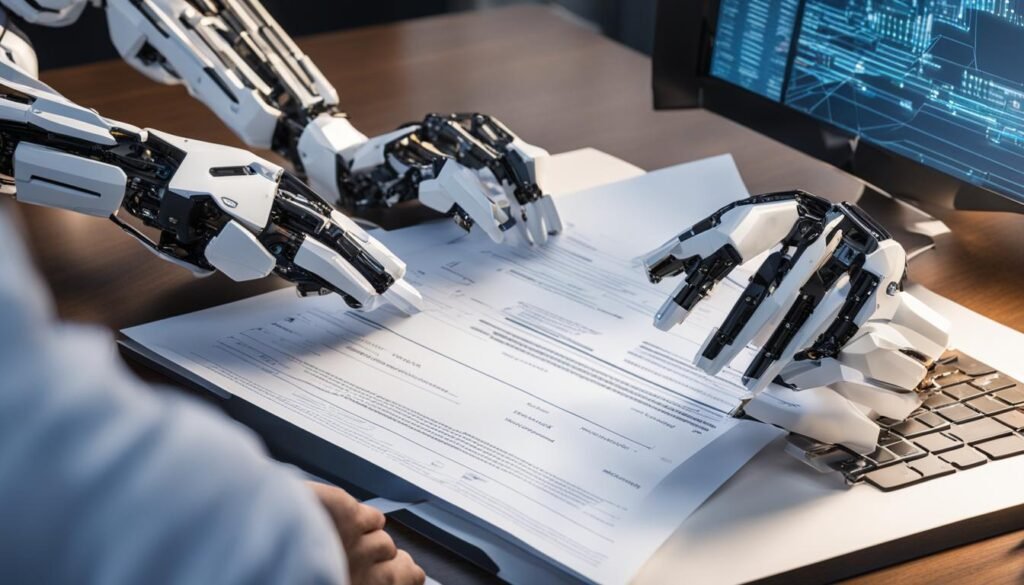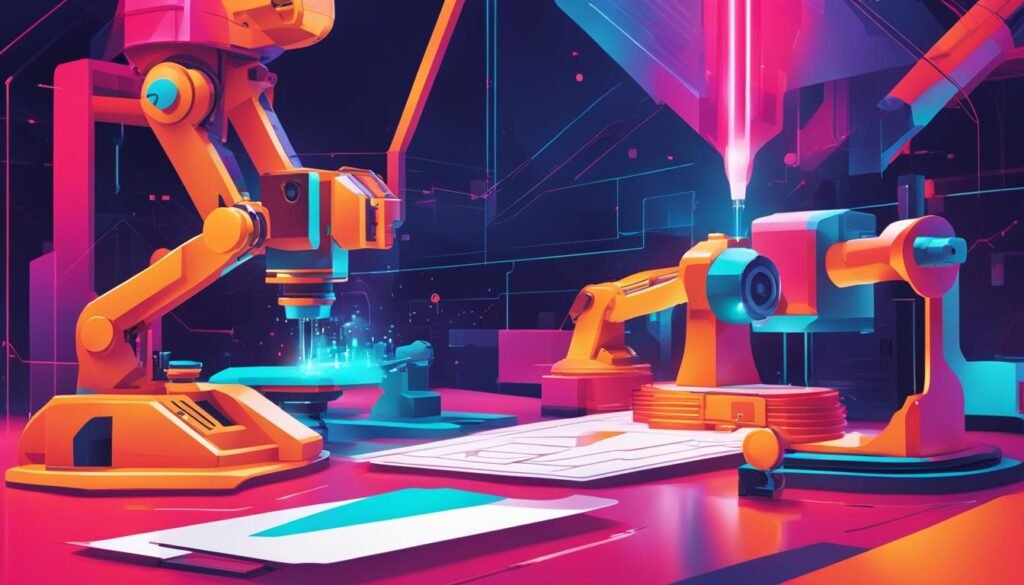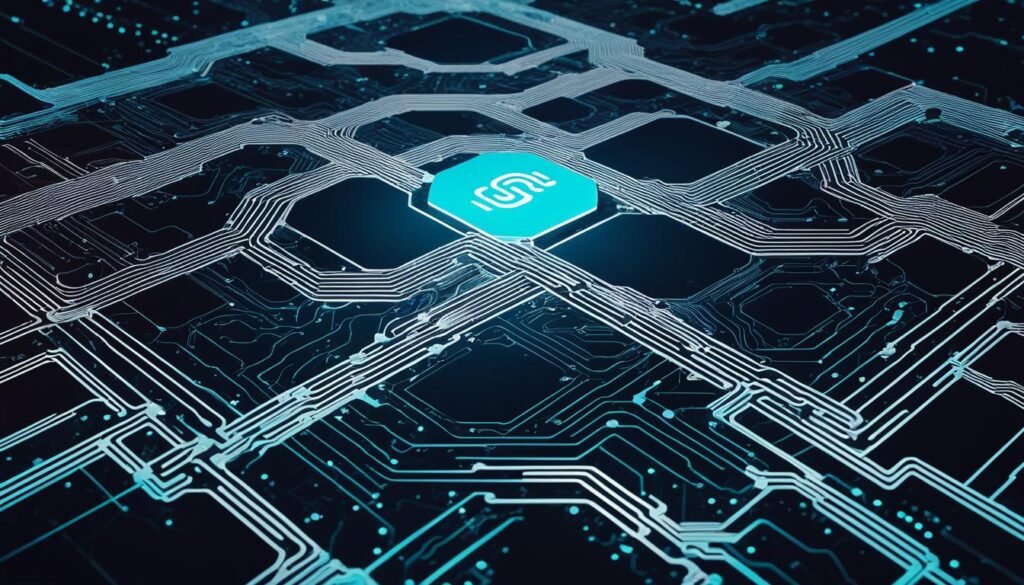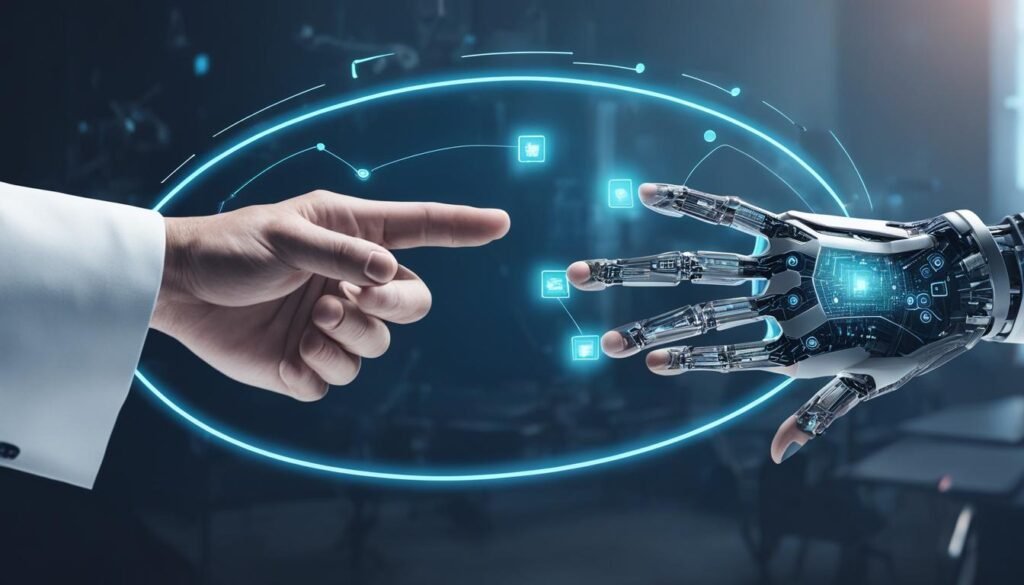Beyond the Signature: How AI is Changing Contractual Agreements

Artificial Intelligence (AI) is revolutionizing various industries, and Contract Law is no exception. AI is playing a significant role in streamlining legal processes and redefining efficiency in digital agreements. Contractual Agreements are essential documents that govern the interactions between parties, and the application of AI technology is creating exciting new possibilities. AI is changing how contractual agreements are formed, executed, and managed, making them more accurate and efficient.
In this article, we will discuss the Role of AI in Contract Law, AI-powered Contract Automation, Enhancing Contractual Performance with AI, AI Contracts: A Step Towards Smart Contracts, Bridging the Language Barrier with AI in Contract Law, AI-assisted Contract Negotiations, The Future of AI in Contract Law, AI in Contract Law: Challenges and Limitations, The Impact of AI on Legal Professionals, AI in Contract Law: Legal and Regulatory Considerations, The Benefits of AI in Contract Law, The Growing Adoption of AI in Contract Law, and Conclusion.
Through this discussion, we will explore the impact of AI on the legal industry, the challenges and limitations of implementing AI in Contract Law, and the future prospects of this promising technology.
Key Takeaways:
- AI is changing how contractual agreements are formed, executed, and managed.
- The use of AI technology in Contract Law is creating exciting new possibilities such as AI-powered Contract Automation, Enhancing Contractual Performance with AI, and AI-assisted Contract Negotiations.
- AI technology can facilitate the transition to smart contracts by enabling self-executing agreements with built-in validation and enforcement mechanisms.
- Overcoming language barriers with AI-powered language translation tools and natural language processing can facilitate cross-border agreements and improve global contract accessibility.
- The impact of AI on legal professionals is reshaping the legal workforce, creating new roles, and necessitating new skillsets to work in an AI-driven legal landscape.
The Role of AI in Contract Law
Artificial Intelligence (AI) is transforming the field of Contract Law by automating various processes involved in creating, reviewing, and negotiating legal agreements. AI-powered systems are being used by legal departments, law firms, and businesses to streamline contract processes, while minimizing errors and increasing efficiency.
AI plays a vital role in the creation of contracts by analyzing large volumes of data and generating contracts using standard clauses and templates. This ensures a faster turnaround time and a consistent format for legal agreements. Similarly, AI-powered tools are being used to review and analyze existing contracts, thereby enabling lawyers to identify potential issues and make informed decisions.
Furthermore, AI technology is being utilized to assist in contract negotiations. AI-powered analytics and monitoring tools gather market data and provide valuable insights to support effective negotiation strategies. This improves the accuracy of contracts, making them less prone to errors and reducing the likelihood of disputes later on.
The role of AI in Contract Law is not limited to the creation of legal agreements, reviews, and negotiations; it is also helping to improve contractual performance. AI-powered analytics and monitoring tools are tracking compliance, managing risks, and optimizing contract performance throughout the lifecycle of the agreement.
Overall, the impact of AI on Contract Law is profound. It is improving decision-making, reducing costs, increasing accuracy, and streamlining legal processes. AI technology is empowering legal professionals to work smarter, faster, and more efficiently, thus providing a competitive advantage in the legal industry.
AI-powered Contract Automation
With the increasing demand for efficient and accurate contract management, AI-powered contract automation is transforming the way contracts are created and reviewed. Using AI algorithms, legal professionals can generate contracts and analyze existing agreements faster and more accurately than ever before, leading to significant time and cost savings for businesses.
The use of AI technology in contract creation enables businesses to streamline their legal processes, reducing errors and ensuring compliance with legal requirements. Additionally, AI-powered contract review enables contract managers to identify potential risks and discrepancies, allowing for timely action and improved risk management.
AI-powered contract automation also allows for more personalized and dynamic contracts. By analyzing data on past contracts and interactions, AI algorithms can help organizations to create contracts that are tailored to specific needs and preferences.

Overall, AI-powered contract automation is revolutionizing the way legal agreements are managed, providing increased efficiency, accuracy, and customization capabilities to businesses.
Enhancing Contractual Performance with AI
Artificial Intelligence (AI) technology is transforming the management of contractual performance. AI-powered analytics and monitoring tools provide real-time insights to help businesses track compliance, manage risk, and optimize their contract performance throughout the lifecycle.
Tracking Compliance
AI-powered tools provide enhanced monitoring capabilities, allowing businesses to ensure compliance with contractual obligations and regulatory requirements. Through the use of machine learning algorithms, these tools can analyze vast amounts of data and proactively alert businesses of any potential compliance issues before they arise.
“AI-powered tools can monitor performance against key performance indicators and automatically highlight and flag deviations.”
Managing Risk
AI technology can help businesses identify and assess potential risks within contracts, reducing the chance of disputes and legal conflicts. By analyzing historical data, AI-powered risk management tools can provide valuable insights and predictions, allowing businesses to make informed decisions when negotiating contracts or renewing agreements.
Optimizing Contract Performance
AI technology can also be used to optimize contract performance throughout the lifecycle. By analyzing data from past contracts, AI-powered tools can identify areas for improvement and make relevant recommendations. These tools can also generate real-time performance reports and provide valuable insights into contract execution, enabling businesses to continually improve their contractual performance.
The use of AI technology in enhancing contractual performance is a significant advancement in contract management, enabling businesses to streamline processes and reduce the risk of legal issues.
AI Contracts: A Step Towards Smart Contracts
As discussed earlier, AI technology is transforming the way contractual agreements are formed and managed. In this section, we will explore the relationship between AI contracts and smart contracts, and how AI is facilitating the transition towards self-executing agreements with built-in validation and enforcement mechanisms.
AI contracts are a type of digital agreement created and managed using artificial intelligence technology. These contracts are designed to be more efficient and effective than traditional contracts, with AI algorithms automating the contract creation, review, and negotiation processes.
Smart contracts take this technology a step further, allowing for the creation of self-executing agreements with built-in validation and enforcement mechanisms. Smart contracts utilize blockchain technology to ensure that all parties comply with the terms of the agreement. The use of blockchain makes these contracts secure and tamper-proof, with all actions recorded on a decentralized ledger.
AI technology is a crucial step towards the development of smart contracts, as it enables the automation and accuracy necessary for the creation and management of these contracts. As AI technology continues to advance, we can expect to see even more seamless integration between AI and smart contracts.

For businesses and legal professionals, leveraging AI technology to create and manage contracts can streamline the process and reduce the risk of errors and disputes. As smart contracts become more widely adopted, they have the potential to revolutionize the way we think about legal agreements, driving efficiency, transparency, and trust in digital transactions.
Bridging the Language Barrier with AI in Contract Law
One of the most significant challenges in global contract agreements is overcoming the language barrier. Thanks to advancements in artificial intelligence, legal professionals can now rely on AI-powered language translation tools and natural language processing to facilitate cross-border agreements and improve global contract accessibility.
AI in Contract Law provides an efficient way to overcome language barriers when creating or reviewing legal agreements. These AI-powered language translation tools and natural language processing techniques save time and money while ensuring that language barriers do not interfere with the accuracy and effectiveness of contractual agreements.

AI technology has made a significant impact in the area of language translation in contract law. By leveraging machine learning and other forms of AI algorithms, legal professionals can obtain accurate translations of legal agreements and eliminate language barriers that hinder communication and impede contract performance.
Moreover, AI in Contract Law provides an additional layer of contract assurance by enabling the inclusion of clauses that correspond to various languages and regions. This means that businesses can create legally binding contracts in multiple languages, enabling smooth and efficient global operations.
AI-powered Language Translation Tools in Contract Law
AI-powered language translation tools in Contract Law operate through machine learning algorithms that can accurately translate legal agreements from one language to another. These tools can detect the language of a contract, translate it automatically, and highlight key clauses that require special attention. Furthermore, AI-powered language translation tools can improve communication across language barriers, facilitate negotiation, and reduce the risk of legal disputes stemming from language misunderstandings.
| Benefits of AI-powered Language Translation Tools in Contract Law | Challenges of AI-powered Language Translation Tools in Contract Law |
|---|---|
| – Accurate and efficient translation of legal agreements – Improved communication across language barriers – Reduced risk of legal disputes stemming from language misunderstandings |
– Limitations in nuances and context, which can create inaccuracies in translations – Concerns about accuracy and liability – Dependence on data and machine learning algorithms |
Adopting AI-powered language translation tools is an essential step for businesses looking to expand their operations globally. These tools can help ensure that language barriers do not impede contractual performance, and business can conduct efficient and accurate operations across borders and continents.
Next, we’ll look at AI-assisted Contract Negotiations and how it is transforming the negotiation process.
AI-assisted Contract Negotiations
One of the key benefits of AI in Contract Law is the ability to support effective negotiation strategies. AI-powered tools are revolutionizing the negotiation process by providing valuable insights that support decision-making, enhance communication, and streamline the negotiation process. These tools use deep learning algorithms to analyze negotiation patterns, gather market data, and anticipate potential roadblocks and solutions.
Thanks to AI-assisted contract negotiations, legal professionals can more effectively identify and prioritize issues and goals, develop creative solutions, and ultimately arrive at successful outcomes. By utilizing AI technology, negotiating parties gain a better understanding of the nuances and complexities of contractual agreements and can work collaboratively to reach their objectives.
However, it’s important to remember that AI is not a substitute for human expertise and judgment in contract negotiations. While AI-powered tools can provide valuable insights and support, the negotiation process still requires a human touch and decision-making. Nevertheless, by integrating AI technology into contract negotiations, legal professionals are empowered to make more informed, strategic decisions and optimize their approach to contractual agreements.
“The use of AI in contract negotiations can provide an invaluable advantage in today’s highly competitive legal landscape. By utilizing technology to support decision-making and strategy, legal professionals are better equipped to navigate the complexities of contractual agreements and drive success for their clients.”
Key benefits of AI-assisted contract negotiations:
| Benefit | Description |
|---|---|
| Enhanced decision-making | AI-powered tools can provide valuable data and insights that assist in decision-making processes, leading to better outcomes for all parties involved. |
| Streamlined process | AI technology can automate tedious and time-consuming tasks, freeing up legal professionals to focus on higher-priority issues. |
| Improved communication | AI-powered tools can help to standardize language and ensure clear communication, reducing the likelihood of misunderstandings or confusion. |
| Efficient negotiations | By providing valuable insights and anticipating potential roadblocks, AI technology can help legal professionals negotiate more efficiently, ultimately reaching successful outcomes more quickly. |

The Future of AI in Contract Law
As AI continues to revolutionize Contract Law, the future holds numerous prospects and potential advancements. With the growing demand for streamlined legal processes, AI-powered contract automation is predicted to become increasingly sophisticated, with more advanced algorithms and machine learning capabilities.
One potential application is the use of natural language processing and sentiment analysis to identify potential areas of dispute and highlight clauses that may require additional negotiation. Additionally, AI technology could help predict the likelihood of contract breaches and offer recommendations for mitigation, thus reducing risks and improving compliance.
Moreover, the ethical implications of AI in legal agreements are a growing concern. It is important to address issues such as fairness, bias, and accountability in AI algorithms and processes. The development of industry-wide standards and best practices will be crucial to ensure the responsible use of AI in Contract Law.
Despite some challenges, the future of AI in Contract Law looks promising. The continued evolution and adoption of AI technology offer significant benefits, including increased efficiency and accuracy in contractual agreements, and improved decision-making in the legal industry.
In the next section, we will examine some of the challenges and limitations of AI in Contract Law.
AI in Contract Law: Challenges and Limitations
While AI technology offers numerous benefits and has the potential to revolutionize the field of Contract Law, it is not without its challenges and limitations. One of the primary challenges is the potential for bias in AI algorithms.
Algorithms can only be as objective as the data they are trained on, which means that if biased data is used, the resulting AI technology can perpetuate that bias. This risk is particularly relevant in legal agreements, which often involve complex and sensitive issues.
Another challenge is the need for human oversight. While AI technology can streamline contract creation, review, and negotiation, and reduce the workload of lawyers and paralegals, it cannot replace human judgment entirely. Human oversight is necessary for ensuring that AI technology is being used appropriately and that legal agreements are accurate and compliant.
There are also legal implications associated with relying solely on AI technology. For example, who would be held responsible if an AI-generated contract contained errors or failed to comply with relevant regulations and laws? The legal system is still grappling with these and other questions related to the use of AI in Contract Law.
Challenges and Limitations of AI in Contract Law
| Challenges | Limitations |
|---|---|
| Bias in algorithms | The need for human oversight |
| Legal implications | Insufficient language processing capabilities |
| Security concerns | Lack of standardization |
Despite these challenges and limitations, AI technology still offers significant potential for revolutionizing the field of Contract Law. As the technology continues to develop and improve, it is likely that many of these challenges will be addressed, paving the way for even greater efficiency and accuracy in legal agreements.
The Impact of AI on Legal Professionals
With the rapid advances in AI technology, the legal industry has undergone significant transformation across multiple job functions. The adoption of AI has impacted legal professionals in various ways, with a shift towards new roles and skillsets in an AI-driven legal landscape.
One of the most significant impacts of AI on legal professionals is the automation of routine tasks, such as contract review and due diligence. This has enabled lawyers to focus on higher-level work, such as strategic counsel and complex problem-solving, which ultimately adds more value to their clients.
Another impact of AI on legal professionals is the need for new skillsets, such as data analytics and coding, in addition to traditional legal training. The integration of AI into legal processes has created a demand for lawyers with a better understanding of technology and the ability to work alongside AI-powered tools.
Moreover, AI has also facilitated a new type of collaboration between lawyers and machines, catalyzing a shift towards a hybrid model of legal practice. Legal professionals are now working alongside intelligent machines, interpreting data and providing judgment, to achieve optimal outcomes for their clients.
As AI technology continues to evolve, the impact on legal professionals is expected to increase. However, this impact is not without its challenges, particularly in ensuring that AI is used ethically and fairly within the legal profession.
Ultimately, the benefits of AI in terms of increased efficiency and accuracy are significant, and legal professionals will need to adapt and embrace this emerging technology to remain competitive in the industry.
Key Impacts of AI on Legal Professionals
| Impact | Description |
|---|---|
| Automation of Routine Tasks | AI has automated tasks such as contract review and due diligence, allowing lawyers to focus on higher-level work. |
| New Skillsets | The rise of AI has created a demand for lawyers with a better understanding of technology and the ability to work alongside AI-powered tools. |
| Collaboration with Machines | Legal professionals are now working alongside intelligent machines, interpreting data and providing judgment, to achieve optimal outcomes for their clients. |
AI in Contract Law: Legal and Regulatory Considerations
As AI technology continues to revolutionize contract law, it is essential to address the legal and regulatory considerations surrounding its use. AI algorithms that power contract automation, creation, and review are only as reliable as the data they are trained on, and there is a growing need for transparency, fairness, and accountability to ensure that AI is used responsibly in legal agreements.
One of the key legal considerations is the potential for bias in AI algorithms. Because AI is only as unbiased as the data it is trained on, there is a risk for discriminatory outcomes in contract negotiations and performance. To mitigate this risk, it is crucial to ensure that AI models are trained on diverse data and to regularly monitor and update them for fairness.
Another consideration is the need for human oversight in the use of AI in legal agreements. While AI can streamline processes and improve accuracy, a human touch is still necessary to ensure that contracts align with legal and ethical norms. It is also important to establish clear lines of responsibility and define the roles of legal professionals and AI in contract law.
The regulatory framework surrounding AI in legal agreements is still evolving. As AI technology becomes more prevalent in contract law, there may be a need for new regulations to govern its use. These regulations could include requirements for algorithm transparency, data privacy, and accountability for AI outcomes.
Overall, legal and regulatory considerations are vital in ensuring that AI is used responsibly and effectively in contract law. While there are challenges and risks associated with AI in legal agreements, a well-defined regulatory framework and a commitment to transparency and fairness can unlock its potential benefits and transform the legal industry.
The Benefits of AI in Contract Law
AI technology is transforming the field of Contract Law, providing numerous benefits to legal professionals and businesses alike.
- Increased Productivity: AI-powered contract automation can streamline contract creation, review, and negotiation processes, saving time and effort for legal professionals.
- Reduced Costs: By automating contract processes, AI can help reduce costs associated with manual labor and potential errors.
- Improved Accuracy: With AI’s ability to analyze vast amounts of data and detect patterns, legal agreements can be drafted and reviewed with greater accuracy and precision.
- Enhanced Decision-Making: AI-powered analytics and monitoring tools can provide valuable insights and support effective decision-making throughout the contractual lifecycle.
These benefits demonstrate the enormous potential of AI technology in the realm of Contract Law, revolutionizing the way legal agreements are created, managed, and enforced.
The Advantages in Practice
A study conducted by McKinsey & Company found that AI-powered contract review tools can reduce legal review time by up to 90%, while increasing accuracy rates from 85% to 95%. In addition, businesses that leverage AI in contract management can experience up to a 20% reduction in processing costs.
“AI’s ability to analyze vast amounts of data and detect patterns can help provide valuable insights and support effective decision-making throughout the contractual lifecycle.”
These concrete examples highlight the potential gains of incorporating AI technology into contractual agreements, providing businesses with increased efficiency and cost savings.
The Growing Adoption of AI in Contract Law
The legal industry has seen a significant shift in recent years towards the adoption of AI technology in contract law. Law firms, legal departments, and businesses are leveraging AI to streamline contract processes and gain a competitive edge in the industry. The use of AI in contractual agreements has numerous benefits, including increased efficiency, improved accuracy, and reduced costs. As AI technology continues to advance, its adoption in the legal industry will likely become even more widespread.
Law Firms Embrace AI for Contract Review
AI technology is being used by law firms to automate the time-consuming process of contract review. According to a recent report, State of Contract Management Report 2021, nearly half of legal professionals surveyed use AI to review contracts. This technology can analyze thousands of documents in seconds, leading to faster, more accurate contract review.
Legal Departments Utilize AI for Contract Creation
Legal departments are increasingly using AI algorithms to draft contracts. These algorithms can assess large volumes of data and provide insights into the most effective contract language and structure. This technology enables faster and more accurate contract creation, allowing legal departments to be more efficient and productive.
Businesses Turn to AI for Contract Optimization
Businesses are leveraging AI technology to optimize the performance of their contracts. By monitoring contract compliance, managing risk, and providing valuable insights into contract performance, AI-powered analytics and monitoring tools can help businesses make informed decisions about their contractual agreements.
Conclusion
In conclusion, AI technology is revolutionizing the field of contract law, streamlining legal processes, and pushing the boundaries of efficiency in digital agreements. By automating contract creation, review, and negotiation, AI technology is increasing accuracy and reducing costs. Additionally, AI-powered contract analytics and monitoring tools are improving contractual performance, managing risk, and optimizing contract performance throughout the lifecycle.
As we look to the future of AI in Contract Law, we must consider the potential challenges and limitations, such as bias in algorithms and the need for human oversight. Nonetheless, the benefits of using AI in Contract Law are numerous, including increased productivity, reduced costs, improved accuracy, and enhanced decision-making. It comes as no surprise, then, that there is a growing adoption of AI technology in the legal industry as it provides a competitive edge by streamlining contract processes.
Overall, the transformative role of AI in Contract Law cannot be understated. The continued evolution of AI technology and its potential future advancements will enable self-executing agreements with built-in validation and enforcement mechanisms, leading us towards a future of smart contracts. Nevertheless, there remains a continued need for legal and regulatory considerations surrounding AI in Contract Law, ensuring transparency, fairness, and accountability in AI algorithms.
FAQ
What is the role of AI in Contract Law?
AI plays a significant role in Contract Law by automating contract creation, review, and negotiation processes, leading to increased accuracy and efficiency in legal agreements.
How is AI used to automate contract creation and review?
AI algorithms are used to generate contracts and analyze existing agreements, allowing for faster and more accurate contract drafting and review.
How does AI enhance contractual performance?
AI-powered analytics and monitoring tools enable the tracking of compliance, risk management, and optimization of contract performance throughout its lifecycle.
What is the relationship between AI contracts and smart contracts?
AI contracts can facilitate the transition to smart contracts by enabling self-executing agreements with built-in validation and enforcement mechanisms.
How does AI overcome language barriers in contract law?
AI-powered language translation tools and natural language processing are used to facilitate cross-border agreements and improve global contract accessibility.
How does AI assist in contract negotiations?
AI-powered tools analyze negotiation patterns, gather market data, and provide valuable insights to support effective negotiation strategies.
What does the future hold for AI in Contract Law?
The future of AI in Contract Law involves emerging trends, ethical implications, and continued technological advancements in the field.
What are the challenges and limitations of AI in Contract Law?
Challenges include potential bias in algorithms and the need for human oversight, while limitations involve the legal implications of relying solely on AI technology.
How does AI impact legal professionals?
AI is reshaping the legal workforce, changing the role of lawyers, and requiring new skillsets in an AI-driven legal landscape.
What are the legal and regulatory considerations of AI in Contract Law?
Transparency, fairness, and accountability in AI algorithms are important considerations, along with the potential need for regulatory frameworks to govern AI contracts.
What are the benefits of using AI in Contract Law?
AI provides numerous benefits, including increased productivity, reduced costs, improved accuracy, and enhanced decision-making in the realm of legal agreements.
Why is the adoption of AI growing in Contract Law?
Law firms, legal departments, and businesses are increasingly adopting AI in Contract Law to streamline processes and gain a competitive edge in the legal industry.


